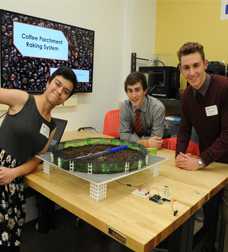WESTERVILLE, Ohio — College students need their coffee. For the first-year engineering class, the success of their final projects relied on it — on Crimson Cup coffee beans that is.
Students in the engineering class at Otterbein University, in Westerville, Ohio, were given the opportunity to apply all they have learned in their first semester and challenge themselves to solve an industry problem.
Their job was to create a consistent, money saving and energy efficient solution to drying coffee parchment — the outer covering of a coffee bean.
An automated process for drying the parchment is favored over the labor-intensive process of patio drying which is traditionally used to dry coffee parchment. This method requires workers to rake piles of coffee parchment under the sun.
The students worked in collaboration with Crimson Cup, a Columbus-headquartered company that roasts sustainably sourced specialty and craft coffee in small batches.
The company also teaches entrepreneurs to run a successful coffee shop through its coffee franchise alternative program, which includes a coffee shop business plan. Crimson Cup coffee is available through a community of more than 350 independent coffee shops, grocers, college and universities, restaurants and food service operations, as well as in the company’s own coffee shops in Columbus.
Based on what they learned, students had to create a machine that would dry the parchment to a specific moisture content, determine an optimal rate of drying, all while making sure the coffee was being mixed consistently.
According to Assistant Professor Michael Hudoba the students were divided into 12 teams. Each team had to brainstorm multiple project designs, while making objective decisions for several possible ideas. They used what they call a “decision matrix” to ensure that unbiased choices were made.
Throughout the creation process, representatives from Crimson Cup met and guided the students in the right direction. In the end, all the hard work led to a competition among the 12 teams, held on Thursday, Nov. 20, 2017.
Representatives from Crimson Cup, Java Central coffee shop of Westerville and professors judged the projects. Four finalists were announced and later presented their projects at an event the following Monday evening.
The event honored and thanked Dr. Joseph and Mrs. Marilyn Harpster, founders of Intek, Inc. in Westerville, who generously funded the engineering lab at The Point and made projects like this one possible.
The Harpsters were joined by generations of their family including their sons Brian (Pam) Harpster ’99, MBA ’04 and their two children; TJ (and Beth) Harpster and their three children; and Marilyn’s sister, Otterbein Trustee Jocelyn Fu Curry ’78, MBA ’09, with her husband, Robert.
Student finalists pitched their finished projects for the gathering and shared their results and experiences with guests.
Lorraine Burger, Mitchell McClain and Adam Stotler made up the first-place team. They were successful in their design and were able to consistently mix their beans in an energy efficient manner.
The Crimson Cup representatives were especially impressed with the unique ideas the first-years presented. They even showed the projects to visitors from Costa Rica, who would ideally be operating the systems if they were to be made at-large.
“It’s a rewarding experience for the students,” said Hudoba. “We are getting them to realize their capabilities.”
When looking to the future, Hudoba stressed that the faculty never repeat a project. They are going to actively seek new industry partners who can offer Otterbein students real world engineering problems — problems even the faculty don’t know all the answers to.
Although their first engineering finals are over, it is no doubt that many cups of coffee are in the first-year students’ futures.
Learn more about Otterbein’s Department of Engineering and The Point at Otterbein University.
Read more about the dedication of the Harpster Engineering Lab.
Lauren Heberling


















